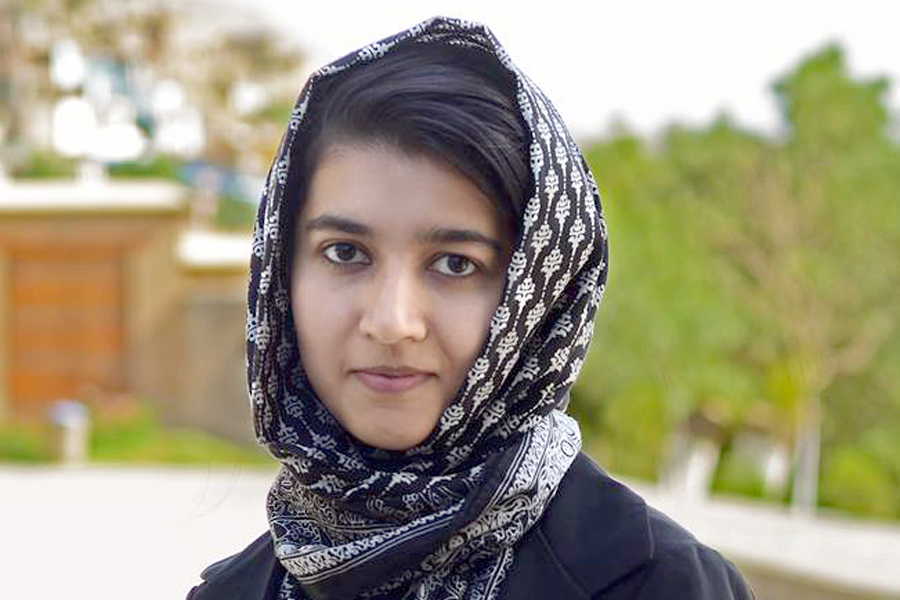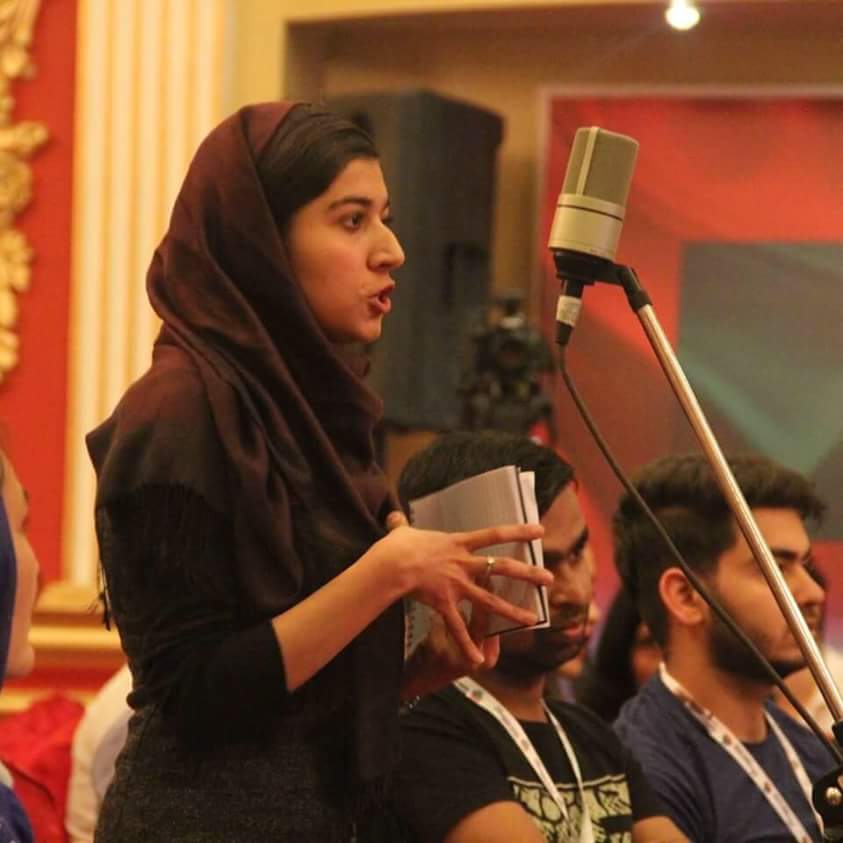AUAF Law Student Wins Emerging Young Leaders Award
Gharsanay Ibnul Ameen, a law student at the American University of Afghanistan (AUAF), has been awarded the prestigious Emerging Young Leaders Award. This program recognizes ten outstanding young leaders from across the globe who are working to enact a positive societal transformation. Gharsanay, as a recipient of this award, visited the United States for an intensive three-week program designed to recognize her work and give her an opportunity to engage with young leaders from across the globe and young American leaders in Washington, D.C., Austin, Chicago, and Roanoke-Blacksburg.
Gharsanay’s many achievements include being the organizer of the Afghan Girls Leadership Program, the co-founder of the Global Youth Development Initiative, an active member of Ethnic Harmony, co-organizer of the first ever Model UN in Afghanistan, team member in the Everywhere Everywoman Project, and all while achieving outstanding marks across her courses as a law student at the American University of Afghanistan in Kabul.
Below is a question and answer with Gharsanay about herself and her many achievements.
Who is your role model?
My mom and dad are my role models. They always tell me “No matter how hard the situation seems to be, you are the change. We believe in you and you are the leader our nation and this world want”.
What inspires you?
I went to school in Nangarhar province. I noticed that my classmates at school and in English and math centers were very talented. I was always thinking that we do have talented minds; we need to provide youth with opportunities for self-growth, for realizing their potentials, and for bringing a positive change to society. Investing in youth, providing them with more opportunities for their carrier development, is not only leading to the development of a country in different aspects such as economic growth, rule of law, political stability, strong institution building, human rights protection and a democratic, united and empowered Afghanistan. It can also play a significant role in the peacemaking process, and in the fight against terrorism and violent extremism around the world. That’s why I became interested in finding ways to invest in youth, to give them the push to realize their potentials so that they start being the change, to materialize their action plans, and at the same time have a better grassroots-level representation. This is my motivation behind organizing the first ever MUN in Afghanistan and being the co-founder of GYDI. The community and the problems my people and the world are facing inspire me to be the change to have a developed, strong, prosperous and peaceful Afghanistan.
What has been your favorite extracurricular to be involved in at AUAF, and why?
AUAF is more than a home for me. It is where I grew professionally and personally way more than I was expecting. I am connected to a diverse, united, and inspiring family. My favorite extracurricular activity at AUAF is the debate club. This is the place where I started challenging my own ideas, and is helpful from different perspectives in the long run as well.
And what’s next – what do you hope to do with your law degree?
When I graduate, I plan to apply to law schools for my graduate studies. At the same time when I am pursuing this degree, I will be working on building the capacity of my team and implementing my projects across Afghanistan so that they are sustainable. I also plan to pursue advance studies in political science. My long term goals are to contribute to a strong united government, strong political institutions, better grassroots-level representation, and to promote youth development and leadership across Afghanistan and globally.
What advice do you have for young women who are seeking to become leaders in Afghanistan?
I believe that when women are engaged in high level leadership roles and when we have grassroots-level representation working closely with people, we are building capacity, countering the extremist approach and have a more peaceful society. As long as women are not engaged in the peace process, peace can’t be achieved. Women need to be in high-level leadership positions, be policy makers, leaders, lawyers, run the economy of the country, be involved and run the institutions, have equal contribution towards strong institution-building and the peace-making process. We are giving leadership trainings to girls, providing opportunities for youth to implement projects to promote unity and ethnic harmony in our community. From one side, these projects contribute to gender equality and create a support group for our young female leaders so that they best implement their action plans, and from the other side we are closely engaged at the community level ensuring meaningful grass root level representation, bringing different ethnic groups together which counters ignorance and extremism. This is an important step to curb fanaticism and terrorism and ensure lasting peace.
My message to women and generally to both young women and men is to dream big. No matter how hard the situation seems to be, you have everything you need to change things for the better. The greater the challenge, the greater the opportunity. Materialize your thoughts through the implementation of action plans – start it! You can change Afghanistan; the strength and power lies in your hand, use the challenges as opportunities for working hard and for making Afghanistan and the world a better place.


About ALEP: Founded in 2007, the Afghanistan Legal Education Project (ALEP) at Stanford Law School develops innovative legal curricula to help Afghanistan’s universities train the next generation of lawyers and leaders. ALEP is one of the projects under Stanford Law School’s Rule of Law Program. For more on ALEP, see: https://law.stanford.edu/alep
About Rule of Law Program: Established in 1999, the Stanford Law School’s Rule of Law Program is the University’s vehicle for promoting the study and practice of international rule of law and development. The program serves as the scholastic and administrative umbrella for Rule of Law Projects in various countries. For more on the program, see: https://law.stanford.edu/rule-of-law-program/
